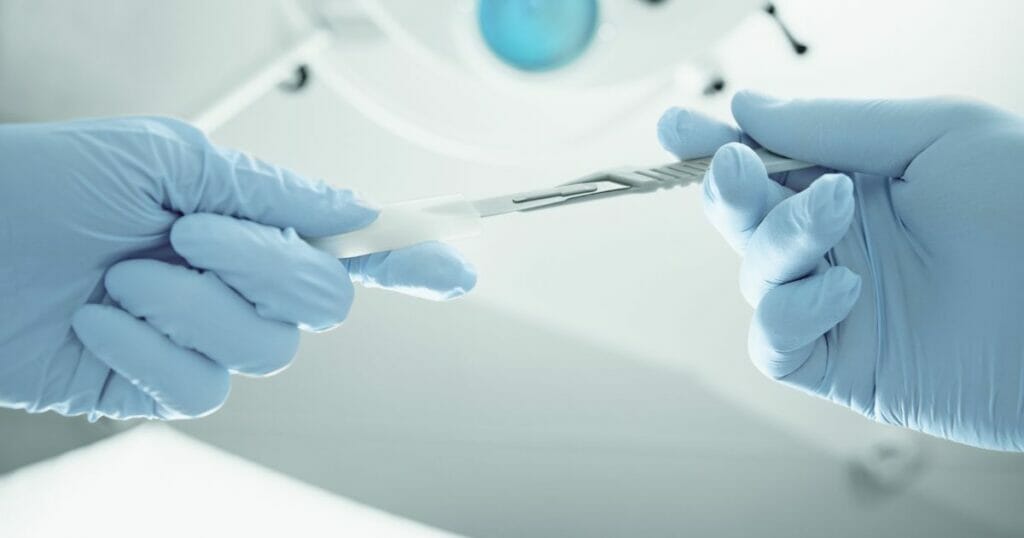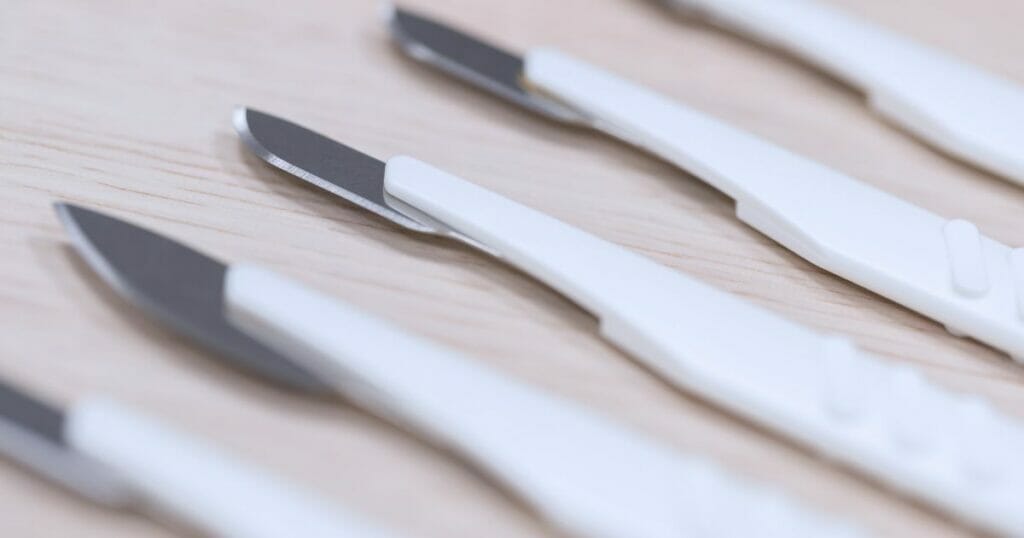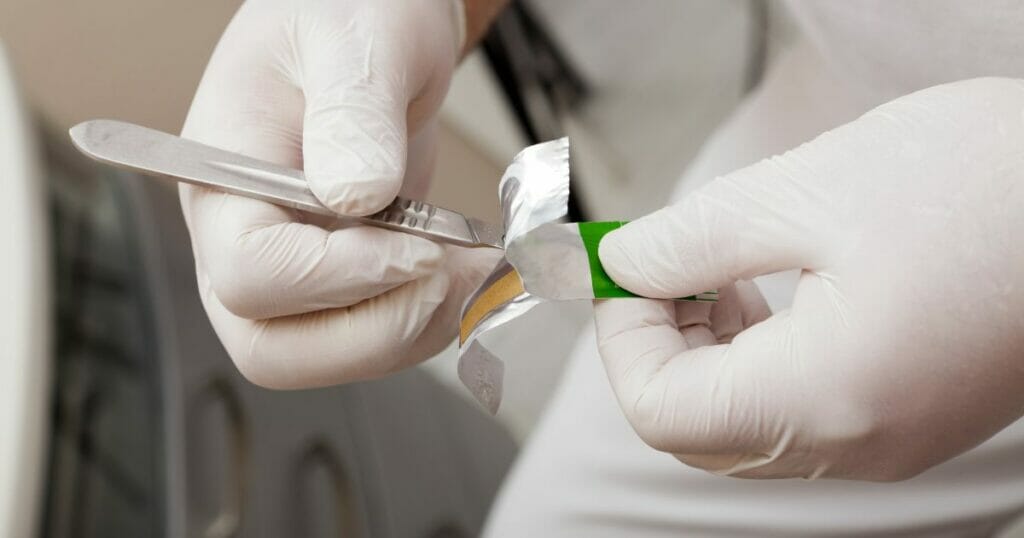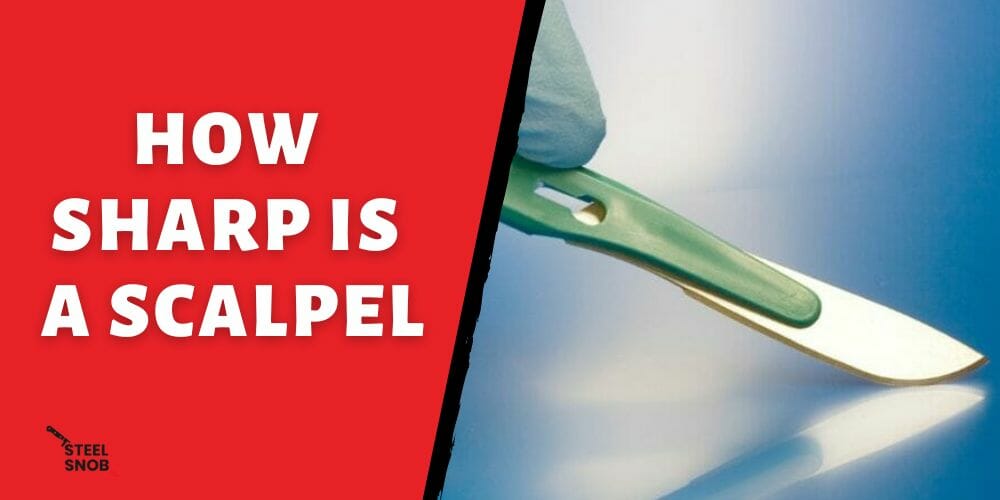There is a lot of debate surrounding how sharp a scalpel needs to be. Some people believe that a sharper blade means less precision, while others believe this results in a cleaner cut.
But how sharp exactly can a scalpel get? In this blog post, we will explore the different aspects of sharpness and try to come to a conclusion about what makes the perfect scalpel blade edge. Keep reading to learn more.
What Is a Scalpel?

A scalpel is a very sharp, thin blade that is used for cutting tissue. Scalpels are usually made of stainless steel or carbon steel. The extensive blade of a scalpel is usually about 15cm long and about 0.25cm wide.
There are two types of scalpels: disposable and reusable. Disposable scalpels are made of plastic and have a disposable, extensible blade. Reusable scalpels are made of metal and have reusable blades.
Scalpels are used in many different types of surgical procedures. They are often used to make small incisions (cuts) in the skin. Scalpels can also be used to remove tissue, biopsy samples, and stop bleeding.
The handle of a scalpel is usually made of plastic or metal. The handle is designed to fit comfortably in the hand of the user. Scalpels are available in many different sizes and shapes. The size and shape of the scalpel will depend on the type of surgery it will be used for.
How Sharp Is A Scalpel?
Scalpels are very sharp, as surgical scalpel blades are made of high-quality steel. The blades are also heat-treated, which makes them even sharper. Scalpel blades are so sharp that they can easily cut through skin and tissue.
The sharpness of a scalpel is measured by the amount of force that is required to make an incision. The sharper the scalpel, the less force is required to make an incision.
The sharpest blades on a scalpel will make a clean cut through skin and tissue. A dull scalpel will tear the skin and tissue, which can cause bleeding and pain.
Types of Scalpels

There are many different types of scalpels. The type of scalpel that you use will depend on the type of surgery that you are having.
Some of the most common types of scalpels include:
- Surgical Scalpels: Surgical scalpels are used to make precise incisions (cuts) in the skin or human tissue. They are also used to remove tissue, biopsy samples, and to stop bleeding.
- Biopsy Scalpels: Biopsy scalpels are used to take a small sample of tissue from the body.
- Dermatology Scalpels: Dermatology scalpels are used to remove skin lesions.
- Ophthalmology Scalpels: Ophthalmology scalpels are used to make incisions in the eye.
- Podiatry Scalpels: Podiatry scalpels are used to remove calluses and toenails.
No matter what type of scalpel you use, it is important to make sure that the surgical blade is sharp. A sharp scalpel will make a clean cut and will cause less bleeding and pain.
How to Sharpen a Scalpel

If you are using a disposable scalpel, you will need to replace the delicate blade when it becomes dull. If you are using a reusable scalpel, you can sharpen the traditional blade shape yourself.
To sharpen a scalpel blade in action, you will need to use a sharpening stone. Sharpening stones are available at most hardware stores.
First, wet the sharpening stone with water. Next, hold the scalpel blade against the sharpening stone at a 20-degree angle. Slowly move the curved blade back and forth across the sharpening stone. Be careful not to cut yourself with the scalpel replaceable blade. It is very sharp!
When to Replace a Scalpel Blade
You should replace the sharp blade of your scalpel when it becomes dull. A dull scalpel can cause bleeding and pain. It can also tear the skin and tissue, which can lead to infection.
You should also replace the sharp edge blade of your obsidian scalpel if it becomes damaged. A damaged blade can cause the scalpel to break during use.
If you’re unsure whether or not the curved cutting edge of the blade of your scalpel is still good, you should ask a medical professional for help.
How to Store a Scalpel
You should always store your scalpel in a safe place. If you are using a disposable scalpel, you can throw it away after use.
If you are using a reusable scalpel, you should sterilize the blade and flat handle before storing it. You should also keep your scalpel away from children and pets. Scalpels are very sharp and can cause serious injury.
Now that you know how sharp a scalpel is, you can be sure to use it safely and effectively the next time you need to make a skin incision. Remember to always sharpen or replace the blade when it becomes dull. And always, make sure to store your scalpel in a safe place!
Is a Scalpel Sharper Than a Razor?
The answer to this question is a little bit complicated: it depends on what you are comparing the scalpel to.
If you are comparing a scalpel to a disposable razor, then the scalpel is definitely sharper. This is because the blade of a scalpel is made of high-quality steel, and is heat-treated to be very sharp.
However, if you are comparing a scalpel to a straight razor, then the answer is not so clear. This is because straight razors can be honed to be extremely sharp. So, it really depends on how sharp the particular razor is that you are comparing it to.
In general, though, a scalpel is going to be sharper than a razor. This is why steel scalpels are used for surgery, and razor blades are not!
Can Scalpels Cut Bone?
The answer to this question is yes and no, being dependent on the type of scalpel that you are using.
Some scalpels, like surgical scalpels, are designed to cut through skin and soft tissue. These types of scalpels will not be able to cut through bone.
Other types of scalpels, like autopsy scalpels, are designed to be able to cut through bone. These scalpels have a much sharper blade, and they are often made of stainless steel.
So, it really depends on the type of scalpel that you are using. If you need to cut through bone, make sure you are using a scalpel that is designed for that purpose!
FAQs
How often should I replace my scalpel blade?
You should replace the blade of your scalpel when it becomes dull. A dull scalpel can cause bleeding and pain. It can also tear the skin and tissue, which can lead to infection.
You should also replace the blade of your scalpel if it becomes damaged. A damaged blade can cause the scalpel to break during use. If you are unsure whether your scalpel blade is still good, you should ask a medical professional for help.
Are scalpels really that sharp?
Yes, scalpels are very sharp! This is why they are used for surgery. A scalpel can cause serious injury if it is not used properly.
Always be careful when using a scalpel, and make sure to replace the blade when it becomes dull. Never use a damaged blade, as this can cause the scalpel to break. If you are not sure how to use a scalpel, ask a medical professional for help.
Where can I buy a scalpel?
You can purchase scalpels at most medical supply stores. You may also be able to find them online.
If you are purchasing a scalpel online, make sure to do your research first. There are many different types of scalpels, and you want to make sure you are getting the right one for your needs.
Is there anything sharper than a scalpel?
There are a few things that are sharper than a scalpel. Diamonds, for example, are much sharper than scalpels. However, diamonds are not practical to use as a scalpel because they are too brittle.
Another thing that is sharper than a scalpel is a laser. Lasers can be used to make extremely precise cuts. However, they are not practical for use in surgery because they can cause damage to surrounding tissue.
While there are a few things that are sharper than a scalpel, nothing is as sharp and practical for use in surgery since the scalpel has the sharpest edge.
Conclusion
We hope this article has answered your question and helped you learn more about modern scalpels. Now that you know how sharp a scalpel is, you can be sure to use it safely and effectively the next time you need to make an incision.
Remember to always sharpen or replace the steel blade when it becomes dull. If you are ever unsure about how to use a scalpel, ask a medical professional for help. And always store your scalpels in a safe place!

